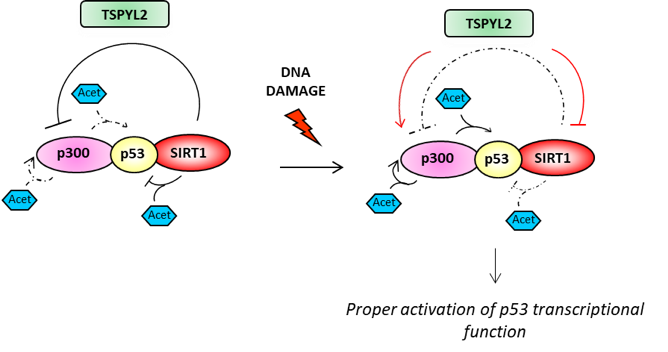Analysis of the gender specific role of TSPYL2 in the DNA damage response
TSPY-Like 2 (TSPYL2) is a nuclear protein, encoded by an X-linked gene, that belongs to the testis-specific protein Y-encoded (TSPY-L) nucleosome assembly protein-1 superfamily. Members of this family are involved in cell cycle regulation, transcription and chromatin remodeling through the modulation of histone acetylation.
Published data and our previous findings suggest that TSPYL2 is also implicated in the DNA damage response (DDR). Indeed, TSPYL2 is required for the maintenance of G1/S checkpoint in response to IR and regulates p53 activity upon different types of DNA damage (Fig.1).

Fig. 1: TSPYL2 role in the regulation of p53. (Magni et al. CDD 2019)
Moreover, our preliminary results support also important and, possibly, sex specific functions for TSPYL2 in both the DDR and tumorigenesis.
Therefore, with this project we want to elucidate the sex specific function of TSPYL2 in the DDR, to determine if it is implicated in the regulation of tumor formation and whether it may contribute to the sexual dimorphism present in some types of cancers.
To these aims, TSPYL2 will be knocked-out (KO) or depleted in both male and female cell lines and the regulation of DDR activation will be evaluated. Moreover, the neoplastic transformation process will be analyzed in normal prostate, mammary and lung cell lines KO for TSPYL2. Finally, TSPYL2 expression will be studied in prostate and breast cancer patients’ specimens.
Results of these studies will increase our knowledge of DDR activation, tumorigenesis and cancer progression, possibly explaining the mechanisms at the basis of cancer sexual dimorphism. In addition, they will provide useful insights for the development of personalized anti-cancer strategies, revealing also if TSPYL2 could be in the future a target for cancer diagnosis and therapy.

